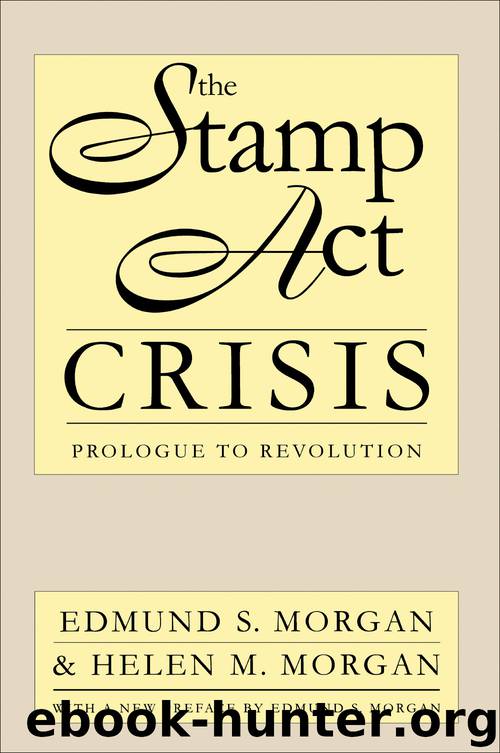The Stamp Act Crisis by Edmund S. Morgan & Helen M. Morgan

Author:Edmund S. Morgan & Helen M. Morgan
Language: eng
Format: epub
Publisher: University of North Carolina Press
Published: 1953-02-27T16:00:00+00:00
In Georgia, as November first approached and passed without news of stamps or stamp distributor for the colony, nervous radicals conducted their demonstrations with nameless effigies and sent threatening letters to a number of conservative citizens suspected of secretly holding the office or of harboring stamps. Finally, on November 7, the Georgia Gazette informed its readers that one George Angus was their man. Angus was not available for threatening, because he had not yet left England. Furthermore, he was not a native of the province, the lone exception to Grenville’s ruling on this point, and hence he was not susceptible to property damage. But it was not property damage that Governor Wright feared for him. To secure him from violence the Governor made elaborate preparations, so that when his ship arrived at Tybee on January 4, he was whisked away to Wright’s house before his presence became generally known. There he immediately took the required oaths of office and distributed stamp papers to the customs officers. In spite of this successful beginning George Angus quickly discovered that his new occupation was not a healthy one, and before two weeks were up he had left for parts unknown.32
The infection did not spread so alarmingly north of New England or south of Georgia, but in the colonies which later participated in the American Revolution there was no one able or willing on November first to put the Act into execution. And in most of these colonies, or so the royal governors claimed, it was the contagious example of Boston which had set off the troubles.
The royal governors, to be sure, were not the most disinterested observers. Each of them was anxious to exonerate himself and his administration from any blame, and Boston provided a convenient scapegoat; yet the charge probably was justified to a large degree. It may even be true, as Governor William Franklin suggested to his father, that “the Presbyterians of New England have wrote to all their Brethren throughout the Continent, to endeavour to stir up the Inhabitants of each Colony to act as they have done, in hopes of thereby making it appear to the Ministry too difficult a Matter to call them to account for their late outrageous Conduct.”33 Probably, however, it was not necessary to write private letters. The printers of colonial newspapers sent exchange copies to one another, and the news of what had happened in Boston, together with the inflammatory remarks of Boston’s patriots, was sent from one end of the continent to the other in the Boston Gazette. The effect of the news in so distant a colony as South Carolina was described by Governor Bull in a letter to the Lords of Trade on November 3, 1765:
Accounts had been received from Boston of the Outrages committed there on the 14th and 26th of August last, and also of those at Rhode Island to show their determined Resolutions to prevent or elude the Execution of the Stamp Act in those Provinces, and also
Download
This site does not store any files on its server. We only index and link to content provided by other sites. Please contact the content providers to delete copyright contents if any and email us, we'll remove relevant links or contents immediately.
| Africa | Americas |
| Arctic & Antarctica | Asia |
| Australia & Oceania | Europe |
| Middle East | Russia |
| United States | World |
| Ancient Civilizations | Military |
| Historical Study & Educational Resources |
Making Haste From Babylon(809)
New York Burning by Jill Lepore(738)
Bunker Hill by Nathaniel Philbrick(702)
An Inquiry Into the Nature and Causes of the Wealth of Nations by Adam Smith(685)
Braddock's March by Thomas E. Crocker(681)
Commonwealth Caribbean Criminal Practice and Procedure by Dana S. Seetahal(634)
The City-State of Boston by Mark Peterson(629)
Infamous Scribblers by Eric Burns(604)
America's Revolutionary Mind by C. Bradley Thompson;(582)
John Adams Under Fire: The Founding Father's Fight for Justice in the Boston Massacre Murder Trial by Dan Abrams(580)
The Barbarous Years by Bernard Bailyn(575)
A Land So Strange: The Epic Journey of Cabeza de Vaca by Andre Resendez(569)
The Wealth of Nations Books I-III by Adam Smith(560)
Bunker Hill: A City, a Siege, a Revolution by Nathaniel Philbrick(558)
American Slavery: A Very Short Introduction (Very Short Introductions) by Heather Andrea Williams(539)
The First American by H.W. Brands(535)
White Slavery In Colonial America: And Other Documented Facts Supressed from the Public Know! by Dee Masterson(535)
The Barbarous Years: The Peopling of British North America: The Conflict of Civilizations, 1600-1675 by Bernard Bailyn(503)
George Washington by John Rhodehamel(500)
